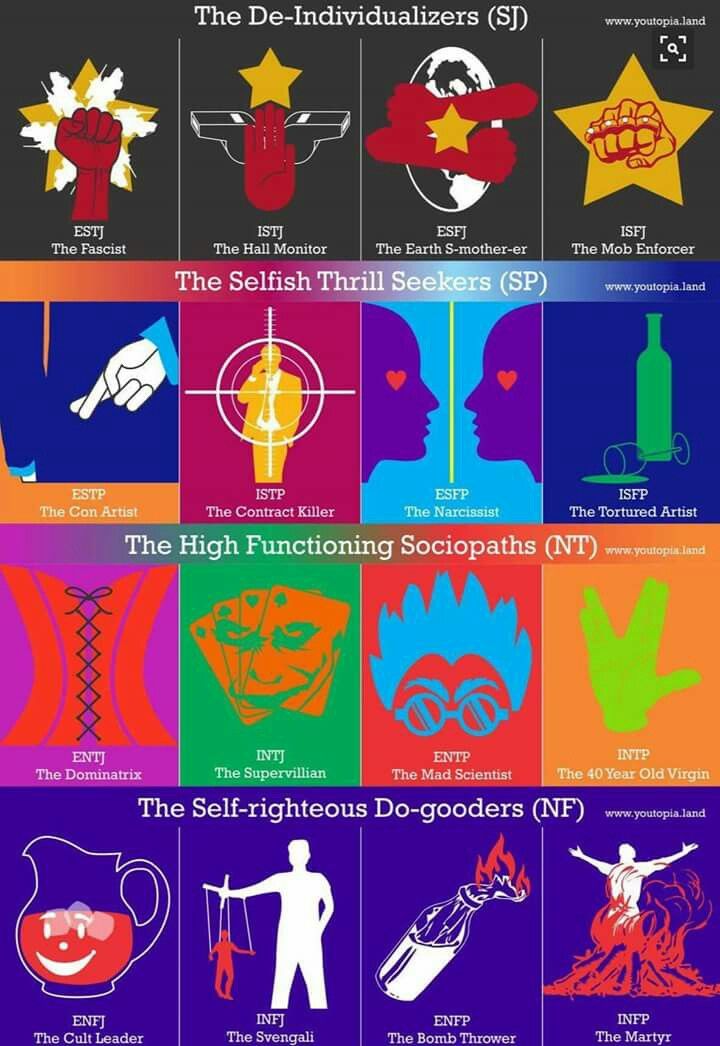Dating a high functioning sociopath
Traits Of A High Functioning Sociopath
Do You Have Questions About High Functioning Sociopaths, Sociopath Behavior, Common Signs Of Sociopaths, Or How To Recognize Sociopaths? Read Here
A mental disorder that is characterized by a person showing no regard for right or wrong and who shows no empathy for the feelings of others is referred to as antisocial personality disorder. Often referred to as sociopathy or sociopathic personality disorder, an antisocial personality disorder is defined by a pattern of a low moral sense of conscience, disrupted personal and professional relationships, impulsive or aggressive behavior, and a lack of respect for authority and rules which sometimes leads to criminal history.
Sociopathy is estimated to affect between three to five percent of the population. There are different types of sociopathy and each is defined by the symptoms the sociopath exhibits. If you think you know someone who may have sociopathy, speaking with an online therapist can help you navigate the relationship.
Sociopath Types
There are different types of sociopaths, and they are usually classified according to the behavior or symptoms that they exhibit.
The Common or General Sociopath
Common sociopaths are considered to make up the majority of those who have sociopathic or antisocial personality disorders. They appear to have no sense of moral compass and are generally very manipulative, especially if they believe their behavior can cause them personal gain.
The Disempathetic Sociopath
Disempathetic sociopaths may feel emotional connections with a select group of people such as close friends or family members. People who are not part of a disempathetic sociopath’s inner circle are typically regarded as objects to achieve some self-serving purpose. While they understand what empathy is, they are not likely to show empathy or concern for anyone outside their inner circle. Even those with whom a disempathetic sociopath appears to have close personal relationships may have limited response or feelings of true concern directed to them.
The Disaffiliated Sociopath
A person who is a disaffiliated sociopath exhibits an extreme inability to connect with others which generally affects every aspect of their life. Some mental health professionals believe that a lack of nurturing from a caregiver as an infant and young child contributes to the seriousness of this type of sociopathy.
The Hostile Sociopath
While not all sociopaths exhibit aggression or violence, the hostile sociopath seems to be angry most of the time. Their feelings of rejection from others often contribute to the level of anger, aggression, or violence they exhibit.
Are You In A Relationship With a Sociopath?
Get Help From A Licensed Therapist
Sociopathy Is A Serious Condition And Can Be Scary. Read More About It.
Learn How to Find Your Happiness In Online Therapy.
A sociopath is a term used to describe someone with an antisocial personality disorder. They think and act without regard for others, and their behavior may include lying, cheating, and manipulating for personal gain. Typically, their narcissism and lack of remorse allow them to achieve their desires by acting on other people’s feelings. On the surface, sociopaths may appear like anyone else. Some sociopaths do not function well in society and spend their time in and out of the justice system.
Typically, their narcissism and lack of remorse allow them to achieve their desires by acting on other people’s feelings. On the surface, sociopaths may appear like anyone else. Some sociopaths do not function well in society and spend their time in and out of the justice system.
The term “high-functioning” sociopath is used to describe sociopaths who are especially skilled at giving the illusion of being what they believe others want to see in them. They are especially skilled at recognizing what other people like and do not like and often use that skill to help manipulate potential targets.
What Is The Difference Between a Psychopath and a Sociopath?
The terms psychopath and sociopath are often used interchangeably when referring to someone with an antisocial personality disorder. According to the American Psychiatric Association, although a psychopath and a sociopath may share some of the same characteristic traits, some behavioral differences distinguish them from one another. The most notable differences between psychopaths and sociopaths are the way they react in social situations and their behavior toward other people.
The most notable differences between psychopaths and sociopaths are the way they react in social situations and their behavior toward other people.
Sociopathic people tend to break rules, disregard other person’s feelings, and act solely for their own gain.
Psychopathy versus Sociopathy: Differences
While psychopaths tend to be very organized, almost to the point that they are obsessed with organization, sociopaths are generally disorganized. Psychopaths seem to have no conscience and are often referred to as cold-hearted. While sociopaths do seem to have some sense of moral conscience, they do not allow their knowledge of right and wrong to dictate their behavior. Both are manipulative and engage others for personal gain.
How to Spot Traits of a High-functioning Sociopath Characteristics
Learning to identify the traits of a sociopath can help you recognize if you are being affected by their behavior and know when to seek help.
High-functioning sociopaths often test well on IQ tests and have superior intelligence. They are very charming, and their magnetic personality seems to naturally draw others to them. High-functioning sociopaths are typically very calculated and may show extreme patience when trying to lay the foundation necessary to work a situation for their good.
They are very charming, and their magnetic personality seems to naturally draw others to them. High-functioning sociopaths are typically very calculated and may show extreme patience when trying to lay the foundation necessary to work a situation for their good.
High-functioning sociopaths usually hold jobs, are married, and have children. They can be extremely successful in life. Until their sociopathic tendencies are triggered by some type of stress such as a change in life or relationship role, the loss of a job, or perceived attacks against them personally, there may be few if any signs that a person is a sociopath at all.
Traits of a High-Functioning Sociopath
By understanding the characteristics of a high-functioning sociopath, you can see how this individual may be manipulating and exploiting you. They are usually very charming and clever, and, at first, their actions may seem genuine. Over time, lies, deceptions, and lack of empathy are exposed to reveal their sociopathic nature. Their common traits may include the following:
Their common traits may include the following:
- High IQ: High-functioning sociopaths often have a higher IQ than other sociopaths or people without personality disorders. This helps them plan, manipulate, and exploit others.
- Lack of empathy: They find it difficult to empathize with others or understand the emotional consequences of their actions.
- Narcissism: They often have strong self-love and grandiose self-image. This occurs because of low esteem and delusional beliefs.
- Charming: Although most sociopaths lack empathy, they are capable of mimicking and manipulating emotions to appear charming and normal.
- Secretive: A sociopath doesn't feel the need to share intimate details with others - unless they are using them to manipulate others.
- Sexually deviant: Since they lack guilt, remorse, and emotional attachments, high-functioning sociopaths tend to have affairs and engage in questionable sexual activity.

- Sensitive to criticism: Despite their lack of empathy, sociopaths desire the approval of others. Sociopathic people feel entitled to admiration and are quick to anger when criticized.
- Impulsive behavior: Sociopaths are often reckless. They typically live in the moment and will do what they feel is needed to reach their immediate goals.
- Sociopaths often lie: Compulsive lying is a common trait among all types of sociopaths. They will often disregard the truth to make themselves look better or get what they want.
- Needing constant stimulation: Sociopaths often get bored easily and need to be actively engaged.
- Addictive Behavior: Their compulsive mindset may result in addiction to drugs, alcohol, sex, gambling, or other addictive behaviors.
- Rule Breakers/ Criminal Behavior: In general, sociopaths are known to be rule breakers. It is not uncommon for them to have a history of criminal activity because of their belief that they are above the law and breaking rules is of no consequence.
 Criminal activity associated with sociopaths could include theft, assault, or destruction of property. High-functioning sociopaths may also participate in more serious crimes or could be serial killers.
Criminal activity associated with sociopaths could include theft, assault, or destruction of property. High-functioning sociopaths may also participate in more serious crimes or could be serial killers.
Possible Causes Of Becoming A Sociopath
Personality is a combination of thoughts, emotions, experiences, and behaviors that make a person a unique individual. Personality forms during early childhood and is influenced by interactions with caregivers. Personality traits can be influenced by religion, culture, and society as a whole. Though the exact cause of sociopathy is not known, certain circumstances, including environmental factors, make one more prone to the disorder.
These risk factors include:
- A family history of antisocial personality disorder or other mental illnesses
- Diagnosis of a childhood conduct disorder
- Exposure to trauma, abuse, or neglect during childhood
- Unstable or violent family life during formative years
Clinical Diagnosis Of A Sociopath
Although the disorder may not be diagnosed until a person is 18 years old or older, sociopathic traits usually manifest by the time someone reaches their early teens. The Diagnostic and Statistical Manual of Mental Disorders V (DSM-5) includes sociopathic traits under the diagnosis of Antisocial Personality Disorder. Any medical advice diagnosis is constructed on the premise that an individual must exhibit at least three of these antisocial behaviors:
The Diagnostic and Statistical Manual of Mental Disorders V (DSM-5) includes sociopathic traits under the diagnosis of Antisocial Personality Disorder. Any medical advice diagnosis is constructed on the premise that an individual must exhibit at least three of these antisocial behaviors:
- Disregarding social norms and lawful behaviors - repeatedly performing actions that are grounds for arrest
- Repeated lying, conning, or deception for personal profit or gain
- Impulsiveness or failure to plan
- Irritable or aggressive behavior is often marked by physical fights or assaults
- Reckless disregard for the safety of self or others
- Consistent irresponsibility - failing to maintain regular work or financial obligations
- Lacking remorse or rationalizing actions that hurt, mistreat, or take from others
To meet the criteria to be clinically diagnosed as a sociopath, the individual must be at least 18 years old, with evidence of conduct disorder before 15 years of age. Their antisocial behavior cannot exclusively occur during schizophrenic or manic episodes or as a result of substance abuse.
Their antisocial behavior cannot exclusively occur during schizophrenic or manic episodes or as a result of substance abuse.
Sociopath Test
There are internet sociopathy tests that may help determine if you or someone you know has sociopathic tendencies. Unfortunately, a high-functioning sociopath may not answer truthfully or accurately for fear of being exposed or criticized.
It is important to note that internet quizzes are not intended for diagnosing disorders, and they cannot give professional medical advice. They can, however, guide as to whether or not someone should seek professional help.
Trained professionals may use the Hare Psychopathy Checklist-Revised (PCL-R) as a diagnostic tool to rate a person's sociopathic, psychopathic, or antisocial tendencies. The Hare PCL-R contains two parts: a semi-structured interview and a review of the subject's file and history. Since sociopaths lie compulsively and without remorse, the information they provide must be confirmed by the subject's case history to arrive at an official diagnosis. This makes the Hare PCL-R much more reliable than self-directed assessments.
This makes the Hare PCL-R much more reliable than self-directed assessments.
Hare's Psychopathy Checklist measures 20 traits associated with antisocial tendencies. Scoring ranges from 0 to 40. Those exhibiting no sociopathic traits would receive a 0. A score of 30 or above qualifies the subject for a psychopathy-related diagnosis. Most people without antisocial personality disorders score around a five.
A professional medical advice diagnosis may discover other mental health conditions, as well.
Sociopathy Is A Serious Condition And Can Be Scary. Read More About It.
Learn How to Find Your Happiness In Online Therapy.
Are You In A Relationship With a Sociopath?
Get Help From A Licensed Therapist
Treating A Sociopath
Treating anyone with an antisocial personality disorder like sociopathy is often a difficult and lengthy process. The prognosis for treatment varies depending on a person's particular situation, their willingness to participate in treatment, and the severity of their symptoms. Many sociopaths have no desire to be treated or cured; however, according to peer-reviewed studies, treatments include:
Many sociopaths have no desire to be treated or cured; however, according to peer-reviewed studies, treatments include:
- Psychotherapy - Using psychotherapy, such as cognitive-behavioral therapy (CBT), can help with some sociopathic symptoms. Therapy could include anger management, challenging delusional thinking, or treatment for addictions and marital problems. Also, therapists can help the willing sociopath find root problems for their issues and give them a chance to change their negative thought patterns and harmful behaviors. The success of psychotherapy relies heavily on the therapeutic relationship between the patient and client. If a sociopath cannot admit to having a problem, it is often difficult to establish the therapeutic rapport necessary for effective psychotherapy.
- Medications - Currently, there are no medications approved by the Food and Drug Administration to treat antisocial personality disorder. Medications can help relieve the symptoms of co-occurring conditions such as anxiety, depression, impulsivity, or aggression.
 Since sociopaths could also have addictive tendencies, the drugs they are prescribed need to be monitored for misuse or abuse.
Since sociopaths could also have addictive tendencies, the drugs they are prescribed need to be monitored for misuse or abuse. - Stress-Reducing Activities - Yoga, exercise, guided meditative strategies, and other alternative therapies may help a sociopath with anxiety and stress. Though these therapies will not "cure" the disorder, they can be used as a supplement for medication and counseling.
- Focus on Relationships - Sociopaths can benefit from working on sustaining healthier relationships with friends, family, and spouses. Marriage and family counseling may help if the high-functioning sociopath is willing. Also, faith communities and 12-step programs like Alcoholics Anonymous may provide necessary social support and accountability for their actions.
Protecting Yourself from a High-Functioning Sociopath
By realizing the behaviors and warning signs of a sociopath, you are better able to protect yourself from their selfish, sometimes dangerous, behaviors. Here are some tips for dealing with high-functioning sociopaths:
Here are some tips for dealing with high-functioning sociopaths:
- Remove them from your life. This may sound harsh and drastic, but it is the best way to protect yourself. Sociopaths' minds operate differently. They will not feel the same emotions you would if someone immediately decided to leave your life.
- Know you can't fix a sociopath. There is no "cure" for a sociopath. As mentioned above, it is a long, difficult process to help sociopath lessen their symptoms. Chances are you may not have the knowledge or resources to give this person proper help, and most sociopaths have no desire to be helped. Without that desire, any form of treatment is useless. Believing you can "fix" a sociopath will only lead to failure and frustration.
- Don't make agreements or deals with a sociopath. The sociopath is looking out for his or her best interests and has no desire to accommodate your needs. If they come at you with "you owe me," remember this line has been used by sociopaths for years.
 Maintain your distance and be wary of any tearful pleas to get you to do or conceal something. This is just another manipulation technique.
Maintain your distance and be wary of any tearful pleas to get you to do or conceal something. This is just another manipulation technique.
- Trust your instincts. If that gut feeling nags at you when you first meet someone, trust it. Sociopaths are experts at alluring others, so, at first, it may be difficult to see through the charming facade. If your instincts tell you something is not right, do not let a sociopath's ego-feeding flattery quiet that little voice.
- Get support. If you have been in a relationship with a sociopath - whether romantic, professional, family, or otherwise - chances are that you have been hurt and abused in some way. A mental health professional can teach you to set boundaries and protect yourself from the deceit, aggression, and anger of a high-functioning sociopath. There may also be local support groups for families and friends affected by antisocial personality disorder.
When You Need Help From Sociopaths (Or Psychopath) Traits
Trying to treat symptoms of sociopathic behavior can be difficult. A person with an antisocial personality disorder may not be willing to seek treatment, if you are in a relationship with someone or have a family member with sociopathic traits or behaviors, it’s important to reach out for help. Sociopaths and psychopaths have a serious mental health condition. You cannot force someone else to get help, but you take care of yourself.
A person with an antisocial personality disorder may not be willing to seek treatment, if you are in a relationship with someone or have a family member with sociopathic traits or behaviors, it’s important to reach out for help. Sociopaths and psychopaths have a serious mental health condition. You cannot force someone else to get help, but you take care of yourself.
If you are concerned about someone with sociopathic personality disorder and their mental health conditions, they exhibit problematic behaviors, or if you are experiencing symptoms that make you uncomfortable, reach out to your primary care provider or mental health professional. Take the time to talk about your concerns. Talking to a counselor or therapist can help you make sense of traits you are experiencing or witnessing.
If you are thinking about suicide or if you are thinking about harming yourself, or others or if you have any medical emergency, you must immediately call the emergency service number (911 in the US and 999 in the UK) and notify the relevant authorities. Seek immediate in person assistance.
Seek immediate in person assistance.
Whether you choose to talk to a local counselor, visit a community mental health center, or engage in online counseling, you can learn effective ways to cope. The team of licensed, professional therapists on BetterHelp will work with you to identify risks for your safety and well-being and help develop a plan of care that is specific to your needs.
Below are some commonly asked questions on this topic:
What makes a person a sociopath?
What makes a sociopath angry?
What is a sociopaths vs psychopaths?
What is the difference between a narcissist and a sociopath?
What is a sociopaths weakness?
Can sociopaths fall in love?
What does a sociopath want in a relationship?
Do sociopaths apologize?
How do you outsmart a sociopath?
What are the 7 symptoms of a psychopath?
Sociopaths in Relationships: Dating a Sociopath
Tanya J. Peterson
Dating a sociopath, having any type of relationship with a sociopath, is usually a shallow, confusing, one-sided experience.
"Having a psychopath [or sociopath] in your life can be an emotionally draining, psychologically debilitating, and sometimes physically harmful experience" (Babiak & Hare, 2006).
Dating a Sociopath
Unbeknownst to the innocent person about to begin dating a sociopath, she was targeted by him for his personal gain. He'll woo her and sweep her off her feet, and when she decides to date him, she'll think it's her choice. She has no idea that it wasn't her choice at all. From the beginning of the relationship, the sociopath was in control. The real reason she will date him is hidden to her. She'll date him because he's identified her as someone who will meet a need (Sociopathic Traits: Characteristics of a Sociopath.
Dating a sociopath can be marvelous. Mary Jo Buttafuoco was married to a sociopath. Despite all of the difficulties, her sociopathic husband was someone "...with whom I shared a million happy, fun times" (2009). The sociopath carefully crafts his relationships so that he can get his partners to do his bidding, whatever that may be. He treats the person he's dating like a queen so he can get away with sneakily treating her like a pawn. He needs to achieve checkmate, and this is his strategy.
He treats the person he's dating like a queen so he can get away with sneakily treating her like a pawn. He needs to achieve checkmate, and this is his strategy.
On the surface, dating a sociopath doesn't seem like dating a sociopath at all. The sociopath can't love, but she can fake it incredibly well. Therein lies one of the first problems that comes with dating a sociopath. The relationship is fake. The sociopath has fabricated a character and is playing a role in order to manipulate and control her unsuspecting partner.
A relationship with a sociopath is often one-sided (the sociopath has a selfish motive whereas her partner is emotionally invested in an actually relationship). Because of this, dating a sociopath is usually not a long-term endeavor. Once she feels she has benefited as much as possible from her partner, she'll abruptly leave him in search of her next victim.
Sociopaths and Relationships
Sociopaths are cold and calculating. To a sociopath, relationships are nothing other than a means to an end, some sort of personal gain be it for money, power, sex, amusement, or any combination thereof. Sociopaths in relationships are entirely self-serving (What is a Sociopathic Person Like?).
Sociopaths in relationships are entirely self-serving (What is a Sociopathic Person Like?).
A sociopath is in total control of the relationship before he even enters it. A sociopath's relationships typically involve three phases:
- assessment; he sizes up the prey to decide if it's worth pursuing and, if so, how best to do it
- manipulation; this is the actual relationship and is not the "love" or "romantic" or "togetherness" phase but instead is the period of time during which he does what he needs to do to meet his goals
- abandonment; sociopaths easily grow bored, and they only go through the trouble of faking a relationship when they have something to gain—when they've gained it, the sociopath's relationship is over.
Sociopaths in relationships see nothing wrong with what they do to the people with whom they're involved. Why would they? Sociopaths feel nothing other than a desire to hurt others and gain something for themselves. They've played the game before, and they'll play it again.
They've played the game before, and they'll play it again.
The person who is or was in a relationship with a sociopath, on the other hand, eventually sees many things wrong with the relationship. Here are some signs you're dating a sociopath:
- What at first appears to be love and devotion is actually shallow charm and manipulation.
- Sociopaths in relationships are confusing. They're insincere and incapable of emotion and empathy; therefore their doting words don't always match their actions.
- Power struggles abound, and the sociopath uses whatever it takes—charm, intimidation, and/or violence—to win. She always wins.
- The sociopath is adept at reading his partner, and once he identifies her weak spots, he uses them to manipulate her.
- The one-sided relationship with a sociopath leaves the exploited partner full of self-blame and self-hatred. A sociopath is incapable of self-hate, so she walks away unscathed.
Don't bother sticking around to see if the sociopath can change. An opportunistic sociopath doesn't even want to change. Their methods work very well.
An opportunistic sociopath doesn't even want to change. Their methods work very well.
"[Sociopaths] can charm the birds out of the trees and tell you black is white, and have you believing it" (Buttafuoco, 2009).
article references
APA Reference
Peterson, T. (2021, December 17). Sociopaths in Relationships: Dating a Sociopath, HealthyPlace. Retrieved on 2022, October 28 from https://www.healthyplace.com/personality-disorders/sociopath/sociopaths-in-relationships-dating-a-sociopath
Last Updated: January 28, 2022
Medically reviewed by Harry Croft, MD
More Info
Narcissists are Never Happy - Excerpts Part 30
Interacting with Your Abuser
There is no Gaol - Excerpts Part 20
Persecutory Anxiety
Abusers, Abusive Behaviors: Table of Contents
The Inanimate as a Source of Narcissistic Supply
The Histrionic Patient - A Case Study
9 signs that you are a sociopath
He has no conscience, he lies and does not blush, he does not blush at all, except perhaps from wine, but never from guilt. Do you know such a person? Congratulations. Although, however, there is nothing: most likely, you happened to meet a sociopath, and before it’s too late, run away from him. You won't like talking to him.
Do you know such a person? Congratulations. Although, however, there is nothing: most likely, you happened to meet a sociopath, and before it’s too late, run away from him. You won't like talking to him.
Sociopathy is a dissocial personality disorder that can affect anyone: your neighbor, boss, girlfriend, husband, child, police officer, and so on. The disorder is not congenital: if a psychopath is to be born, then sociopathy is the result of childhood trauma, perhaps even abuse, physical or emotional.
"Suffer" is not quite the right word: sociopaths don't suffer from their disorder at all. But those around you get it. Because sociopaths do not put them in a penny, they live for their own pleasure, and nothing will force them to at least look at their behavior from the outside.
Cold, sinisterly attractive, unaware of doubts and remorse, fearless and ready to take risks, these people are dangerous to others. But it is rather difficult to understand: sociopaths are so charming that it is easy to fall in love with them, to see a teacher, a guru, a savior of the fatherland. And only when your life is destroyed or at least turned upside down, you will start to look around and ask what it was.
And only when your life is destroyed or at least turned upside down, you will start to look around and ask what it was.
The biggest problem with a sociopath is that they are hard to recognize.
More precisely, it is easy to misunderstand him: not knowing how to experience such feelings as love, compassion, shame, guilt, they know very well how to show them.
These are excellent actors: not every psychiatrist will be able to accurately determine the first time that he is a sociopath. What can we say about us mere mortals.
Why you need to stop tolerating resentment
When you feel that a loved one constantly raises self-esteem at your expense, do not blame yourself...
07 October 10:24
The easiest way to confuse a sociopath is with a narcissist - a charming, narcissistic idiot who endlessly flaunts in front of a mirror and posts selfies (according to a study conducted in 2015 at Ohio State University, men who often take selfies and select them for social networks are prone to narcissism) .
But wait. A sociopath is not an idiot at all. And he may have plans for you.
In 2005, American psychologist Martha Stout wrote a book that has become a classic, The Sociopath Next Door. In it, she clearly explains how high our chances are to suffer from the actions of sociopaths - because these are not movie characters.
Sociopaths often become criminals - but much more often their lack of conscience leads them to power.
And they begin to manage other people's lives in a way that suits them. To do this, you do not even need to declare yourself a guru or become the founder of a sect.
9 signs that you are at the mercy of a sociopath
1. He is charming
Sociopaths have a special attraction - and people who need to be nurtured and guided like to be around such a strong, powerful person. This calms them down, gives them confidence in the future.
In addition, sociopaths are often sexually attractive. By the way, they use it: promiscuity is one of the hallmarks of a sociopath.
2. He is unpredictable
And this distinguishes him from his psychopathic brother, with whom he is easily mistaken. Both do not experience emotions.
But if a psychopath is inclined to build and implement his plans in cold blood, then a sociopath is capable of spontaneous, inexplicable, often risky actions.
He can break the rules and go beyond the accepted.
3. He does not feel shame, regret or guilt
And it is pointless to be offended by them for this: they are simply arranged in such a way that such feelings are unknown to them. Because of this, alas, they can, without a twinge of conscience, betray, lie, intrigue, threaten - in general, harm other people in every possible way.
They act solely in their own interests - and because of this they often succeed in business and politics.
4. He likes to brag
More precisely, to exaggerate the significance of one's achievements or the exclusivity of one's experience. When telling a story from his life, a sociopath dramatizes events, embellishing, exaggerating, inventing colorful details - but at the same time he sounds extremely convincing.
When telling a story from his life, a sociopath dramatizes events, embellishing, exaggerating, inventing colorful details - but at the same time he sounds extremely convincing.
5. He must win at any cost
It is better not to compete with such a person at all: in any situation he needs to win, and he will not disdain any means. This is a desperate debater who always wins, and if he is caught in a lie, he will dodge to the end, but will never admit it.
Do you have symptoms of burnout at work. Quiz
Do you fantasize about being fired and can't see your colleagues? Gazeta.Ru dealt with the psychological...
February 16 15:01
6. He is very smart
High intelligence is rare, and it is especially offensive that sociopaths use their intellectual abilities to cheat and manipulate other people.
7. He doesn't love anyone
A sociopath is incapable of experiencing love. He can imitate it: he knows the right words and movements - so you don’t even know that, in fact, he is completely cold. But in fact, he does not know what love, empathy or sympathy is.
But in fact, he does not know what love, empathy or sympathy is.
8. He never apologizes
And no wonder, we already understood that he does not feel guilty. So why empty words, some kind of apology? For what? Even when he is caught by the hand or pushed against the wall, he does not admit that he was wrong. On the contrary, he goes on the attack.
Try to directly and convincingly accuse him of something, giving evidence and examples. In response, he will attack you with accusations, stating that you specifically want to denigrate him and are probably already weaving a secret conspiracy.
9. He often presents himself as a knight with high moral principles
In fact, he can be a swindler, a deceiver, even a thief, but in words it always turns out that he is desperately fighting for the truth. He imagines himself almost the only person thanks to whom the world has not yet collapsed.
In work groups, sociopaths often provoke conflicts, pit people against each other, and declare themselves to be saviors, ready to keep the company from disintegration and ruin.
What not to do when communicating with a sociopath
You probably already figured out who the sociopath is in your environment, and you were scared enough. The worst thing about this story is that you can't change a sociopath. It remains to understand what to do if, for example, it is impossible to completely avoid communication. Or at least - what not to do, as M.I. suggests in his blog Sociopath World. Thomas, author of Confessions of a Sociopath (Confessions of a Sociopath), published in the US in 2014.
Remember what doesn't work when dealing with a sociopath:
1. Accusations and counter-accusations
Trying to blame a sociopath will only lead to a scandal, from which you will come out, having failed.
2. Emotions
Sociopaths are not at all interested in hearing about how you feel about their behavior. Never show emotion or raise your voice in an argument with such a person.
3. Threats and ultimatums
Any pressure, including emotional pressure, is perceived by the sociopath as a challenge, as part of the game, and immediately joins the competition. Which is guaranteed to win.
Which is guaranteed to win.
4. Reasoning about good and evil
Don't try to judge what is good and what is bad, the sociopath doesn't know, which means he doesn't care.
How to communicate with a sociopath - Lifehacker
March 21, 2020Relationships
Living and working with a person who does not consider the feelings of others is difficult, but possible.
Share
0Who is a sociopath
A sociopath is a person suffering from antisocial personality disorder. Such people lack empathy, the ability to understand the experiences of others and emotionally respond to events. Therefore, a sociopath does not perceive social norms and rules, constantly violates them and does not consider other people's feelings.
Because of their high intelligence and disregard for rules, sociopaths make the best criminals. And although most do not do anything illegal, sociopaths are potential manipulators, ready to use people for their own purposes.
Lifehacker has already told in detail how to crack a sociopath. You need to be on your guard if a person:
- at the beginning of communication was charming, but gradually begins to dictate his will to you;
- lies a lot and often, writing stories on the go without any problems;
- lives without friends, family, does not talk about the past, but is surrounded by admirers;
- prone to sudden outbursts of anger and aggression;
- tries to isolate you from society;
- narcissistic to the point of megalomania;
- likes to manipulate other people to achieve their goals;
- knows how to keep an icy calm in stressful situations.
How to properly communicate with him
It is better, of course, not to communicate at all. If you understand that you have a sociopath in front of you who is going to achieve what you want with your help, then it is better to refuse communication in time than to suffer later.
Easy to say but hard to do, especially at work, with friends or family.
Assess your risk
If you are a suggestible person, easily influenced by others, or lack confidence, try to keep communication to a minimum. The more vulnerabilities you have, the easier it is to manage you. It is these people who are the victims of manipulation.
This does not mean that the sociopath should be demonstratively avoided. Just try to do less common things.
Think of yourself
Sociopaths choose as victims dependent people who tend to obey instructions. The best way to protect yourself from a sociopath is confidence and independence, your own position and ability to think. The more independent a person is, the more difficult it is to control him, which is why sociopaths do not like them.
It can take years to figure out who you are and what you are striving for. Learn new things, communicate with different people and listen to someone else's point of view, but do not accept it immediately. This will help develop independent thinking.
This will help develop independent thinking.
Learn self-confidence. It's difficult, but necessary.
Do not fall for provocations
That is, do not feed the troll. If you are not being manipulated, then it is not interesting to manage you - a sociopath will quickly get bored. Keep calm in communication, do not go into conflict.
Do not tell a person that he is a sociopath
This will either make him angry or provoke him. And it may well be that the sociopath is not aware of his behavior. In general, do not show that you have figured it out. Maintain polite communication.
Do not fall for his charm
A sociopath knows how to charm and knows how to present himself favorably. But this is not a reason to forget about who is in front of you. Remember that behind the stream of compliments lies some kind of catch.
Seriously, don't give in. A sociopath knows how to poison stories in order to arouse sympathy and sympathy, knows how to prove his importance. This is normal for him, but if you believe and follow, you risk becoming a victim of manipulation in the future. Yes, this is not very good, after all, a person is not to blame for sociopathy and mental disorder. But that doesn't make it any easier for you, does it?
This is normal for him, but if you believe and follow, you risk becoming a victim of manipulation in the future. Yes, this is not very good, after all, a person is not to blame for sociopathy and mental disorder. But that doesn't make it any easier for you, does it?
End a difficult relationship
If you recognize a manipulator in your partner and his behavior poisons your life, try to end the relationship as soon as possible. The longer you wait, the harder it is to break free from a sociopath. While feelings can be strong, relationships with a sociopath are often life-threatening. Take a closer look: maybe this is just your case.
Just don't confuse sociopathy with indifference.
Want to put a label on someone who hurt you or acted selfishly? Perhaps there are reasons for such behavior, the person made a mistake and repents. The sociopath made no mistake, does not worry and will do it again - when he needs it.
It is not easy to end a relationship with a sociopath on your own if you have already fallen under his influence. Enlist the support of friends and family. Get ready for the fact that the sociopath does not accept rejection and will be ready for reckless actions for the sake of your attention.
Enlist the support of friends and family. Get ready for the fact that the sociopath does not accept rejection and will be ready for reckless actions for the sake of your attention.
Warn Others
It's not worth shouting around every corner that you've identified a sociopath, but it's sometimes worth warning shared family and friends, especially if you see that someone has fallen under the influence of a manipulator. Help the victim to understand the situation. Of course, you don’t have to fight off a sociopath with a gun, but you shouldn’t completely let the situation take its course.
Don't be afraid
After all that has been written and said about sociopaths, it's hard not to get paranoid and suspicious of everyone around you. But it is not necessary to write down people with a vile character in this category. And do not think that every sociopath will use you and destroy you.
As already mentioned, a sociopath has a high intelligence, so many people understand that their reactions and behavior are unusual.














